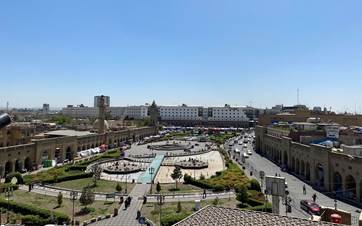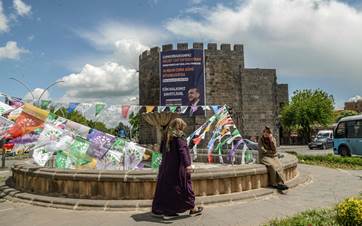
Kurdistan Region President Nechirvan Barzani and Iraqi President Mustafa al-Kadhimi in Baghdad on September 2, 2020. Photo: Kurdistan Region Presidency
French President Emmanuel Macron killed two birds with one stone on Wednesday; assuring Iraqi and Kurdish leaders of French support for Iraqi sovereignty, while also paving the way for Erbil and Baghdad leaders to sit down together to help solve their long-standing oil and budget disputes.
Macron's one-day visit following his trip to Lebanon made him the most senior foreign official to travel to Iraq since Prime Minister Mustafa al-Kadhimi ascended to power in May.
In Baghdad to meet with Macron, Nechirvan Barzani, in his third visit to the capital since assuming the post of the president in June 2019, covered a lot of ground, sitting down for a host of meetings with Iraqi leaders to discuss a range of issues. It was a productive day and such meetings have been described as a "win-win" strategy by political scientists, who believe Baghdad may be reassessing how it deals with Erbil.
President Barzani met with Iraqi President Barham Salih, Iraqi Prime Minister Mustafa al-Kadhimi, Speaker of the Iraqi Parliament Mohammed al-Halbousi and Ammar al-Hakim, the leader of the National Wisdom (Al-Hikma) Movement. In all these meetings they discussed that for all unresolved issues, Erbil and Baghdad should resort to the constitution.
"Fundamentally, there seems to be recognition that cooperation between Erbil and Baghdad is essential in Baghdad's bid to strengthen the internal sovereignty of Iraq," Nigel Mark Greaves, an associate professor from the Department of Politics and International Relations at the University of Kurdistan - Hewler, told Rudaw English via email on Thursday.
"Indeed, the 'mood music' coming from Baghdad appears to be changing rapidly. There is much greater willingness in Baghdad to work with the Kurdish Region to address issues, which are actually of mutual concern."
"Baghdad alone is most unlikely to reach its goals of creating peace and stability in the country. If I am right, it has taken Baghdad some time to reach this conclusion, but the indications are that it is now accepting that the stand-off with Kurdistan cannot continue, at the least for good security and indeed economic reasons," Greaves added.
"Depending on how it is now played, there is a game-theoretical potential 'win-win' for both Baghdad and the Kurdish Region in this and further cooperation in the future” he said.
President Barzani's visit also came just over a week after US Secretary of State Mike Pompeo said that he had urged the Iraqi federal government to "clinch a budget deal" with the Kurdistan Regional Government (KRG).
Pompeo's comment followed KRG Prime Minister Masrour Barzani and Kadhimi's announcement earlier this month that they had reached a temporary deal, in which Baghdad will send 320 billion dinars ($270 million) monthly to Erbil for the KRG to pay its civil servants.
The KRG's share of the Iraqi federal budget is a chronic point of contention between Erbil and Baghdad. The Kurdistan Region is heavily dependent on its share of the Iraqi budget, and Kurdish officials have said they cannot pay civil servants without what it says is its fair share of federal government money.
Erbil says it is entitled to its 12.67% share of federal funds, as stipulated by Iraq's 2019 budget law, while Baghdad says the KRG has not lived up to its end of the deal that includes turning over 250,000 barrels of oil daily to Iraq's State Organization for the Marketing of Oil (SOMO), a state-owned oil company.
Before the August agreement, Baghdad had not sent funds since April, leaving KRG civil servants unpaid for months and public anger rising.
Demonstrations and strikes calling on the KRG's current cabinet to resign occurred several times in Sulaimani province, while protests by teachers in May over delayed pay in Duhok were shut down.
"Baghdad must understand firstly that it cannot continue to use the budget as a weapon in which to threaten the Kurds, and thus to attempt to exert dictatorial control over the Kurdish Region," Greaves added.
Also discussed were Iraq's upcoming snap elections, the fight against Islamic State (ISIS), the latest political and security developments in Iraq, the COVID-19 pandemic and its impact on the economy of the country, and the situation of IDPs in camps across the Kurdistan Region and efforts to facilitate their return home.
Dr. Hemin Hussein Mirkhan, a lecturer in the department of Business and Management at the University of Kurdistan Hewler (UKH) says that the "tremendous respect" President Barzani enjoys among Iraqi leaders will be helpful for a total normalization of Erbil-Baghdad relations that have partly been strained since the events of October 2017, which saw relations spiral as a result of the Kurdistan Region's independence referendum.
"The implications post-referendum [have] proven the fact that dialogue is the only option...for both Erbil and Baghdad. These kinds of meetings are vital for a positive political development. The mutual support of Barzani and Kadhimi is a win-win strategy for both sides: protecting the sovereignty of Iraq through a strong KRG,” Mirkhan said via email.
"The Kurdistan President tries to normalize the relations with Baghdad through supporting the current PM [Kadhimi]," Mirkhan added. "The goal is to avert any attempts to undermine the KRG as a legal and political entity and to alleviate the misunderstanding[s] between the two parties."
"I am optimistic that Iraq federal government and the KRG have a good intention to reach a common ground and solve their outstanding issues," Mirkhan added.
President Barzani's visit to Baghdad has received praise from other sides for being successful.
Saadi Ahmed Pira, a member of the Patriotic Union of Kurdistan (PUK) politburo, told Rudaw on Thursday that "all the diplomatic activities that we as Kurds had in Baghdad [Wednesday] have rarely been seen in the past."
Zubir R. Ahmed, a Rudaw Kurdish columnist and lecturer at Salahaddin University-Erbil echoed the sentiment that "Macron's visit was also an attempt to bring Erbil and Baghdad closer to each other."
President Barzani in Ankara
Turkey is an important trade partner for the Kurdistan Region and Erbil enjoys good relations with Ankara. This summer, however, there is a lot of public anger among Kurds because of Turkey's military incursion against the Kurdistan Workers Party (PKK) within Kurdistan Region borders, which has killed eight civilians.
Just two days after his visit to Baghdad, the Kurdish president traveled to Ankara on an official invitation from Turkey's President Recep Tayyip Erdogan, where he also met with Foreign Minister Mevlut Cavusoglu, mainly discussing Erbil-Ankara relations and recent regional developments.
Turkey has pursued the PKK in the Kurdistan Region for decades, but its campaign this summer is pushing into populated areas, just kilometers away from major urban centres. Scores of villages have been emptied in the offensive.
Baghdad and Erbil have both condemned Turkey's violation of Iraq's sovereignty and have also called on the PKK to cease its activities.
Safin Dizayee, head of the KRG Department of Foreign Relations (DFR) who accompanied Barzani on his trip to Ankara, told Rudaw that Barzani's visits to Baghdad and Ankara demonstrate "the Kurdistan Region's strong political position".
"The meetings are of high importance. They demonstrate the strong position of the Kurdistan Region in protecting the political balances of the region. The Kurdistan Region has demonstrated it embodies the role of a player across the equations."








Comments
Rudaw moderates all comments submitted on our website. We welcome comments which are relevant to the article and encourage further discussion about the issues that matter to you. We also welcome constructive criticism about Rudaw.
To be approved for publication, however, your comments must meet our community guidelines.
We will not tolerate the following: profanity, threats, personal attacks, vulgarity, abuse (such as sexism, racism, homophobia or xenophobia), or commercial or personal promotion.
Comments that do not meet our guidelines will be rejected. Comments are not edited – they are either approved or rejected.
Post a comment